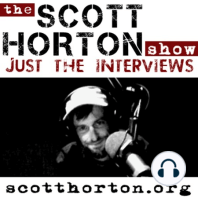49 min listen

1/11/24 Keith Knight on the Reasons He Left Progressivism
1/11/24 Keith Knight on the Reasons He Left Progressivism
ratings:
Length:
59 minutes
Released:
Jan 17, 2024
Format:
Podcast episode
Description
Scott interviews Keith Knight about his new book Domestic Imperialism: Nine Reasons I Left Progressivism. They go through a number of insights, all cited in the book, that convinced Knight that those with compassion for the world’s poor ought to embrace nonaggression and free markets.
Discussed on the show:
Domestic Imperialism by Keith Knight
Keith Knight is Managing Editor of the Libertarian Institute, host of the Don’t Tread on Anyone podcast, and the author of Domestic Imperialism: Nine Reasons I Left Progressivism and organizer of the Voluntaryist Handbook. Follow him on Twitter @an_capitalist
This episode of the Scott Horton Show is sponsored by: Moon Does Artisan Coffee; Roberts and Robers Brokerage Incorporated; Tom Woods’ Liberty Classroom; Libertas Bella; ExpandDesigns.com/Scott.
Get Scott’s interviews before anyone else! Subscribe to the Substack.
Shop Libertarian Institute merch or donate to the show through Patreon, PayPal or Bitcoin: 1DZBZNJrxUhQhEzgDh7k8JXHXRjY
Learn more about your ad choices. Visit megaphone.fm/adchoices
Discussed on the show:
Domestic Imperialism by Keith Knight
Keith Knight is Managing Editor of the Libertarian Institute, host of the Don’t Tread on Anyone podcast, and the author of Domestic Imperialism: Nine Reasons I Left Progressivism and organizer of the Voluntaryist Handbook. Follow him on Twitter @an_capitalist
This episode of the Scott Horton Show is sponsored by: Moon Does Artisan Coffee; Roberts and Robers Brokerage Incorporated; Tom Woods’ Liberty Classroom; Libertas Bella; ExpandDesigns.com/Scott.
Get Scott’s interviews before anyone else! Subscribe to the Substack.
Shop Libertarian Institute merch or donate to the show through Patreon, PayPal or Bitcoin: 1DZBZNJrxUhQhEzgDh7k8JXHXRjY
Learn more about your ad choices. Visit megaphone.fm/adchoices
Released:
Jan 17, 2024
Format:
Podcast episode
Titles in the series (100)
9/27/21 Kevin Gosztola on the CIA’s War on Assange, Wikileaks and Journalism Itself: Kevin Gosztola is back on the show to discuss a recent Yahoo! News article about Assange that went viral. Gosztola thinks the piece contains some good reporting but leans too much on a flawed Russiagate framing. by Scott Horton Show - Just the Interviews